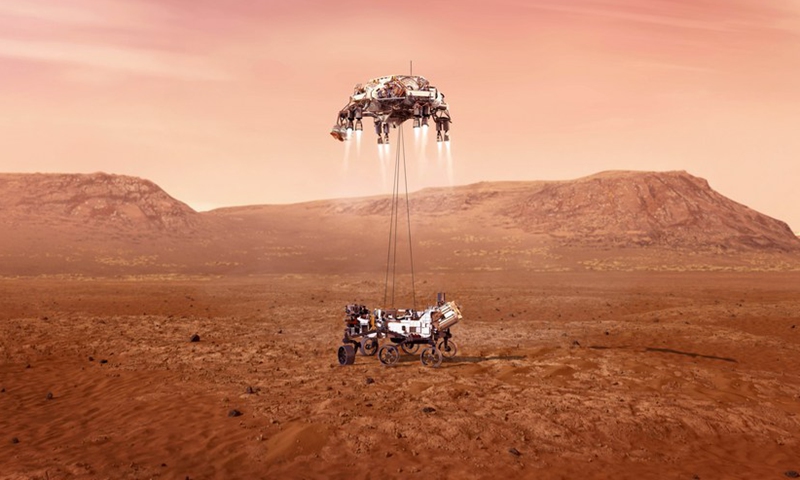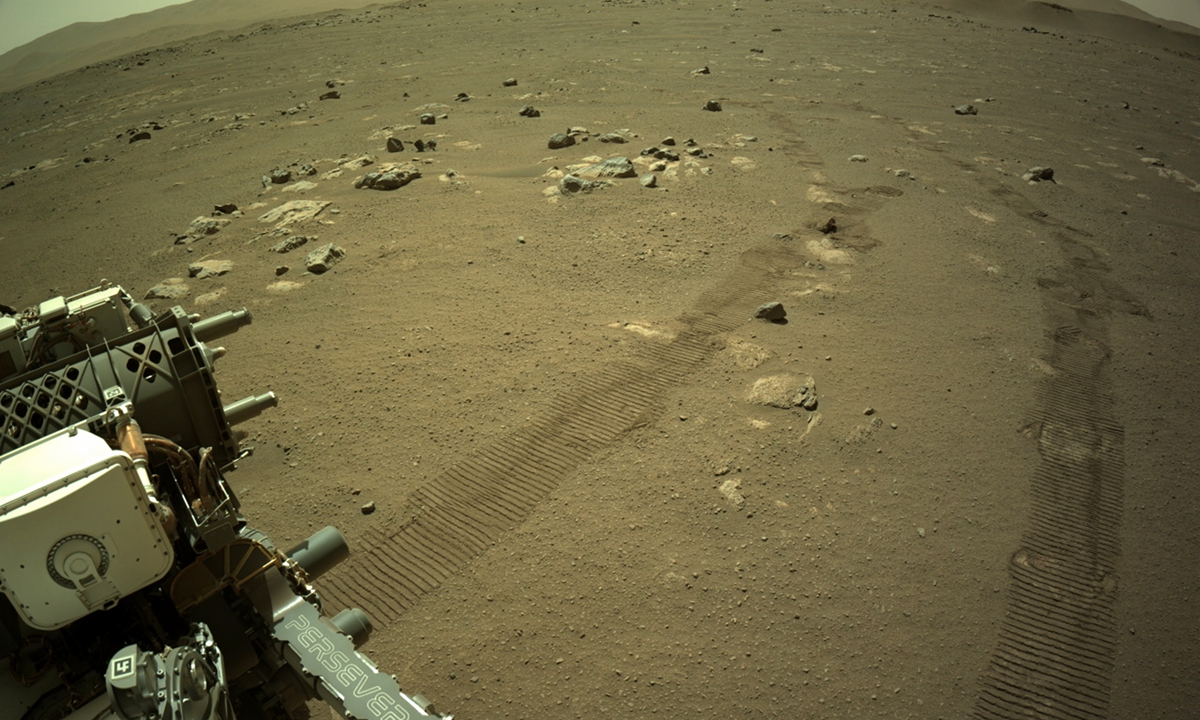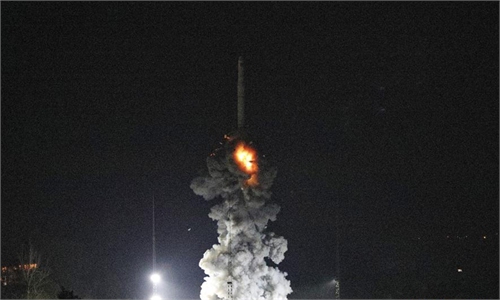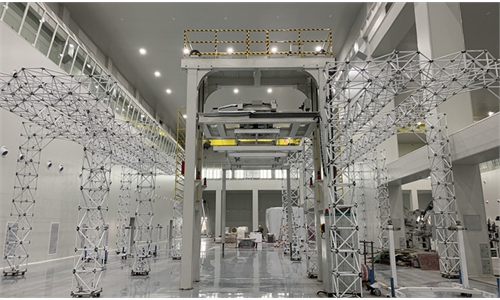CNSA data exchange with NASA over Mars missions a prelude to wider China-US space cooperation?
US should show respect, end Cold War mentality first for real cooperation: analysts

This image made available by NASA shows an illustration of NASA's Perseverance rover landing safely on Mars. Photo:Xinhua
The China National Space Administration (CNSA) and its US counterpart NASA held working-level meetings and communications from January to March 2021 on exchanging data to ensure the flight safety of Mars spacecraft, the CNSA confirmed with the Global Times on Wednesday.
The CNSA made the statement in response to inquiries from the Global Times following reports that NASA recently conducted talks with CNSA in efforts to obtain information on the orbit of China's Tianwen-1 Mars probe, in order to lower the risk of collision with a handful of other spacecraft currently in Martian orbit.
Could such a rare but not unprecedented interaction between China and the US in the space field signal a prelude to ice-breaking? Chinese observers reached by the Global Times on Wednesday said they are cautiously optimistic about the potential common ground between the two space powerhouses, while admitting there are many obstacles to overcome before Beijing and Washington can meet halfway above Planet Earth.
NASA Acting Administrator Steve Jurczyk revealed the discussions with China during a question-and-answer session after a March 23 speech at a meeting of the Federal Aviation Administration's Commercial Space Transportation Advisory Committee, US-based SpaceNews magazine reported on Tuesday.
"Most recently, we had an exchange with them on them providing their orbital data, their ephemeris data, for their Tianwen-1 Mars orbiting mission, so we could do conjunction analysis around Mars with the orbiters," the NASA chief was quoted as saying in the report.
"To assure the safety of our respective missions, NASA is coordinating with the UAE, European Space Agency, Indian Space Research Organisation and the CNSA, all of which have spacecraft in orbit around Mars, to exchange information on our respective Mars missions to ensure the safety of our respective spacecraft," NASA said in a brief statement it provided to the US magazine.
Any exchange of information between NASA and CNSA or other Chinese organizations is restricted by what is commonly known as the "Wolf Amendment," named after former congressman Frank Wolf, who a decade ago chaired the House appropriations subcommittee that funds NASA and first included the restrictions. Similar provisions have been added to annual appropriations bills since then, including the fiscal year 2021 spending bill enacted in December.
However, there have been proposals made in the US calling for the restrictions should be lifted, or at least that efforts be gradually made to this end.
"As a start, the US should at least respond positively to China's overture. First steps can be modest ones, including data sharing and cooperation on climate initiatives. As trust grows, more ambitious missions could be explored, perhaps including China's wish to be a part of America's advanced Martian exploration program," a Bloomberg opinion piece said on March 25.
Chinese space experts pointed out that the interactions between the two agencies are more of an exchange rather than technical cooperation. However, it would serve as a good start for a wider range of cooperation scopes, as the US has been reaching out to China despite restrictions from federal laws such as the Wolf Amendment, while China has always welcomed any possible space collaboration with any global players, including the US.
At the recent China-US Alaska high-level meeting on March 18, Yang Jiechi, a member of the Political Bureau of the Communist Party of China (CPC) Central Committee and director of the Office of the Central Leading Group for Foreign Affairs, said, "While the United States has talked about its cooperation to land on some other planet with the European side, China would welcome it if there is a will to carry out similar cooperation from the United States with us," according to the website of the US Department of State.
Previously, when China and Russia signed the memorandum of understanding on joint construction of an international lunar research station, the two sides said it will be "open to nations that are interested in the project as well as all partners of the international community."

NASA's Mars Perseverance rover acquired this image on March 14, 2021 (Sol 23) using its onboard Right Navigation Camera (Navcam).
China's 500-meter aperture spherical radio telescope (FAST), the world's largest single-aperture radio telescope, also known as China's "Sky Eye," will officially accept observation applications from scientists around the world on Wednesday at midnight. The results will be announced on July 20, and observations will officially begin in August.
"US scientists have already realized that for China and the US, the two front runners in space with abundant economic and technological resources, information sharing would bring about more breakthroughs in a more efficient manner," Wang Ya'nan, chief editor of the Beijing-based Aerospace Knowledge magazine, told the Global Times on Wednesday.
Within the current legal framework, it is "totally possible" for China and the US to engage in more frequent data exchanges on the movements of the spacecraft so as to ensure their safety, since there are potential risks of collision if their respective flying courses are unclear to each other, Wang noted. "Another step forward would be the sharing of scientific research results, which the US already proposed several times during the Chang'e-4 and Chang'e -5 missions, to acquire China's lunar data. But all such exchanges must lay on the premise that the US treats cooperation with China on an equal, fair ground."
Observers implied that China's upcoming space station, which is expected to be the most advanced in space, has also put pressure on the US to seek interactions. With the US' current space station about to expire, it is looking for other partners that could invite it onboard.
In addition, China's space station and lunar research station, with the help from its Russian counterparts, has greater development potential as they would include more partners from developing countries, which have far greater needs for conducting, sharing and using scientific results than the small circle of friends made up solely of developed countries that the US currently holds.
"China's continuous efforts in developing its own space powers and abilities are the keys to changing how the US views us. When they realize that China could do better without external help, they will seriously start wondering if cooperation is in fact the right path to take," said Wang.
Analysts also said that major obstacles remain as a result of broad legal restrictions and political stances from the US, manifested in NASA's latest act listing the island of Taiwan as a "country" in an application form for the "Send your name to Mars" activity on its website, which shows the US agency's lack of respect for China's core interests of sovereign integrity.
"The biggest problem facing China-US space cooperation is that the US has brought politics into the science world, and regards scientific competition as conflicts of values and ideologies. Since the US has put up its highest alert against China for allegedly 'stealing' its technologies, the cooperation between two parties still has a long way to go," Song Zhongping, an aerospace expert and TV commentator, told the Global Times on Wednesday.
Chinese space analysts also expressed growing worries over how the US is pushing its space agenda, citing the Artemis Accords, which explicitly excluded China, as an example, and highlighting the US' obsolete Cold War mentality.




